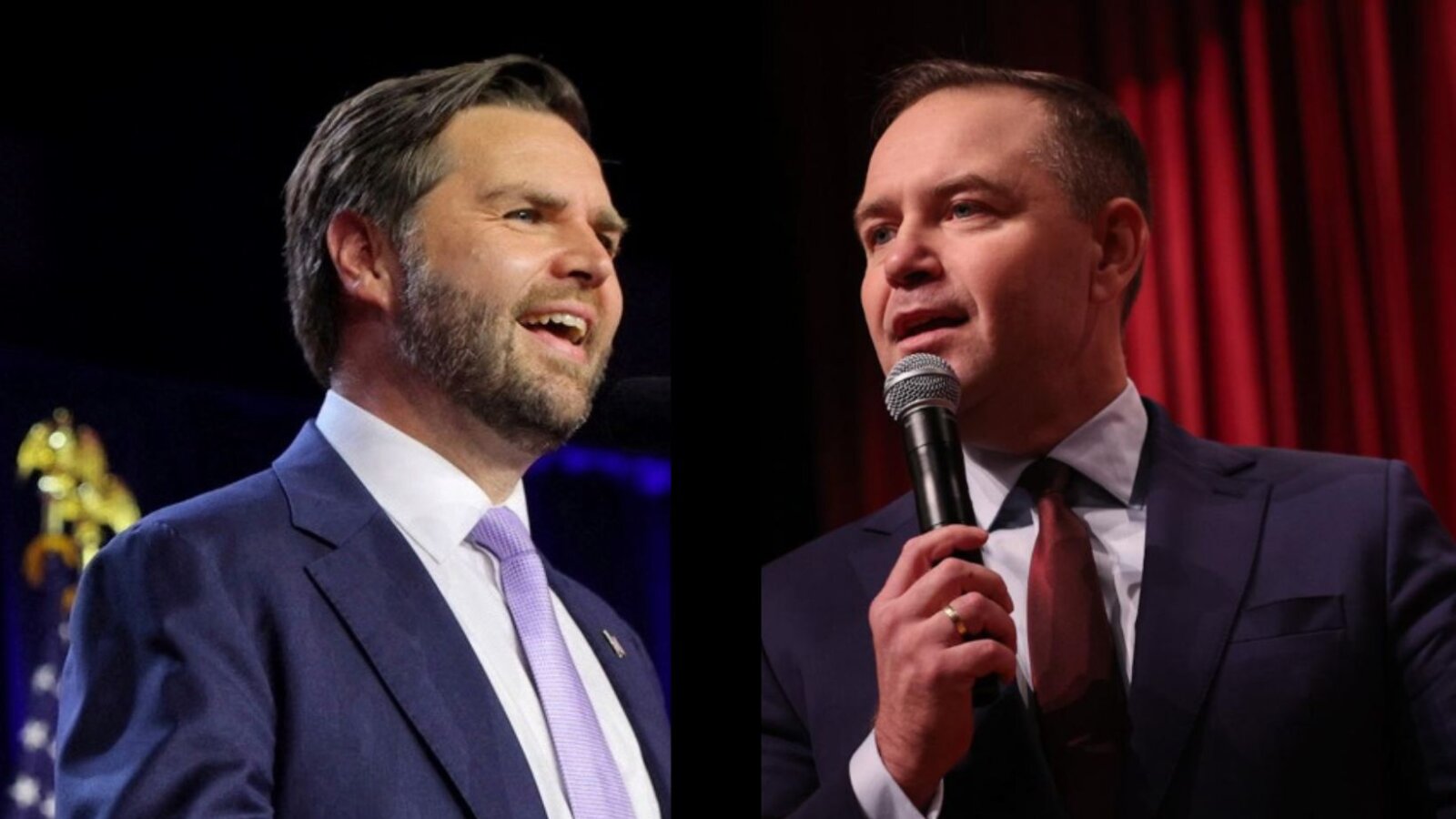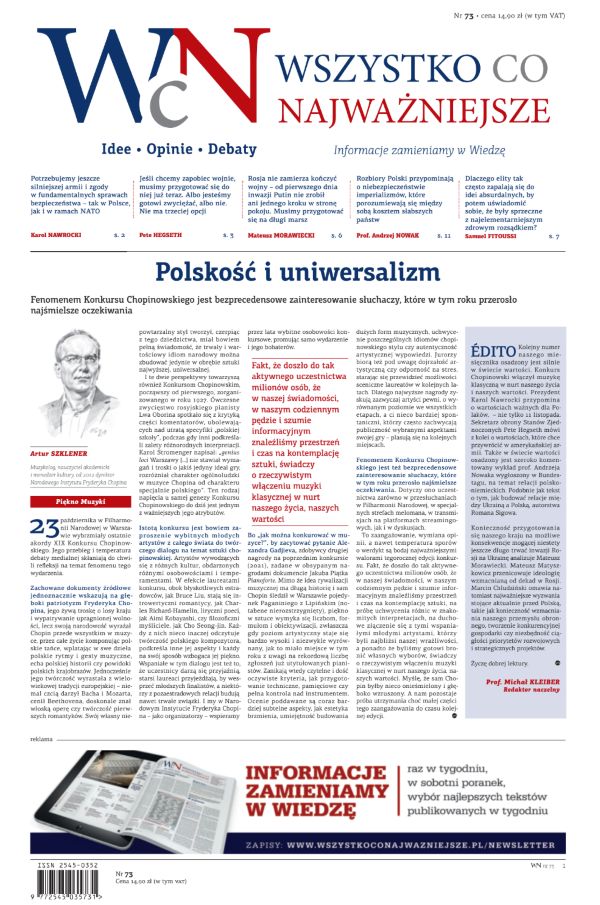
 Karol Nawrocki, J.D. Vance and the Lament of the Elites
Karol Nawrocki, J.D. Vance and the Lament of the Elites
Karol Nawrocki and J.D. Vance – why such a pairing? If you like, we can allude here to Plutarch of Chaeronea’s Parallel Lives, which juxtaposes and compares figures such as Alexander and Caesar, or Demosthenes and Cicero. Our great men are still alive and have long careers ahead of them. Their lives do indeed show numerous similarities.
.They are almost the same age. Both may be described as conservatives, representing the broadly defined right wing – or the Camp of Common Sense. Both are detested by the liberal elites. Both have shown, time and again, that they are not easily cowed. Are they role models for the younger generation or heralds of a new age?
Karol Nawrocki
.Karol Nawrocki hails from a block-of-flats neighbourhood in Gdańsk, a place where acquaintances are not a matter of choice. He has a sporting career behind him, including amateur boxing. That, too, was no salon but a harsh school of life, survived only by the strong-willed. Today he holds a doctorate in history and serves as President of the Institute of National Remembrance – currently on leave for the duration of the campaign.
Karol Nawrocki defends an honest account of Polish history, dismissed as ‘nationalist propaganda’ by the ill-disposed. For a thousand years, we have been dealing with powerful neighbours, and as a result, our memory is bound to clash with the historical perspectives of both Russia and Germany. Polish–Russian relations are tense – that much is straightforward. The situation with Germany is more complex. They are our ally and economic partner within the same union, and yet their pride, their superbia teutonica, resurfaces repeatedly under the guise of pro-European policies. Little wonder Nawrocki isn’t popular with our neighbours; in fact, the Kremlin considers him a major enemy. He also works to honour those who suffered under Stalinism and helped arrange the state funeral for the Cursed Soldiers, Danuta Siedzikówna ‘Inka’ and Feliks Selmanowicz ‘Zagończyk’. Not everyone welcomed this – there are more heirs of Stalinism than we would like.
Life is full of pivotal moments that shape a person’s perspective. For Karol Nawrocki, I would argue, it was marriage and fatherhood. There is no need to delve into private details. What matters is that Marta, his future wife, became a mother at seventeen. Two years later, she and her son were joined by Karol, then a twenty-year-old, now a husband and father. Fools will sneer, but to me it is a beautiful story. All the more so in our times, when abortion is treated as a human right (and, in the case of women, practically the only one), with the procedure itself presented as light, easy and painless – a notion echoed by the name of the so-called angels of death, the Abortion Dream Team.
But here we have a young man who sees a girl in deep trouble and offers his life to her and her child. The usual advice to her would have been: “We’ll help you. There’s an easy way out.” To him: “Don’t bother, lad, it’s not your concern. Besides, you can see well enough what she’s like.” To both: “Don’t waste your lives.” And yet the child is here, standing beside his father just as his father stands beside him. One more human being on this earth – one who was not supposed to exist. And there is also a solid family, tested, and so far, proven victorious. Has anyone wasted their life here? Hardly.
This story is especially galling to the liberal salon, for it shatters the image of the man as an irresponsible male. The unspoken premise of pro-abortion arguments is that the man will father a child and then vanish. “That’s what they all do.” And so the woman is left alone, unless she finds aid from the lightning-bolt sisterhood. Yet here we see that a man can take responsibility for a woman, even when she has a child that is not his own – a choice as extreme as they come. And we also see that the reward can be great.
Time and again – like the boxer he once was – Nawrocki has shown he can take a hit, stay on his feet and strike back. As head of the Institute of National Remembrance, he has proved his concern for Poland’s best interests. In those matters, too, he is prepared to endure the blows of left-wing, Europhile (and often Germanophile) criticism. This is not the conduct of a man who entered politics for the spoils. Even when confronted by a tough opponent, he will not leave the ring.
Would we prefer a president a from a good home, unable to face a fight without a psychologist at his side and the backing of media spin-doctors? I don’t think so.
J.D. Vance
.J.D. Vance comes from what Americans call the ‘Rust Belt’ or ‘flyover country’, the land looked down upon with contempt from a plane flying between New York and Los Angeles. It’s a place where you’ll find nothing but unemployment, alcoholism, drug addiction, prostitution and crime. A life of aimless drifting. And yet, people live there. Well-heeled Americans call them hillbillies, rednecks or white trash. But for J.D. Vance, they were neighbours, friends and family. The chances of escaping such an environment are slim. For Vance, the anchor was his grandparents, affectionately called Mamaw and Papaw. Thanks to them, he did not go off the rails and was able to pursue his education. Although they lacked formal education, they possessed firm moral convictions. Among the principles they imparted to their grandson, one in particular has stayed with him. As he recalls, ‘Mamaw and Papaw ensured that I knew the basic rules of fighting: You never start a fight; you always end the fight if someone else starts it; and even though you never start a fight, it’s maybe okay to start one if a man insults your family.’
Step by step, he advanced in his education and eventually graduated from Ohio State University. But he wanted to go further, which was no easy task. It turned out, however, that the very best universities reserved a number of places for poor students – a gesture towards equal opportunity. Thus, he enrolled at Yale Law School. A great achievement, but what to do next? How to fit into the student community? His classmates went out partying, confident that, having paid enough, they would receive their diplomas in any case. But Vance had to work – what a bore. And whenever he did join in, he could not afford extravagance. He had to grit his teeth and hope that no one would laugh at him. More than once he was shocked by the behaviour of his peers. After a meal at a local fast-food restaurant, they would leave chicken bones scattered on the tables, smear sauces across them and spill their drinks. He felt ashamed to leave such a mess for the cleaners, that is, people like him. Together with a friend, he tidied it up. For the others, cleaning up after anyone – even after themselves – was an alien experience.
Life in the upper circles was full of potential landmines, from how to dress and behave to which wine to order at a restaurant. White, obviously. But when the waiter offered Sauvignon blanc or Chardonnay, he opted for Chardonnay as it was less difficult to pronounce.
One day he was assigned to a project with a fellow student named Usha. He described her as a genetic anomaly – intelligent, hardworking, tall and beautiful. Her parents had come from southern India and had risen to the upper middle class. She became his guide in the world of higher spheres. She believed in him and, in the end, she married him. Her faith in him was not misplaced – today she is the Second Lady.
Little by little, he entered the fairy-tale world of the rich and famous. At Yale, one might bump into the governor of New York in the corridor. Former prime minister Tony Blair gave seminars to small groups – his son was a student there as well. Naturally, it was more advantageous to be born into that social class, where a career could begin with a simple phone call from your father to a senator. Still, once inside, countless opportunities opened up. When Vance began looking for work, the Yale diploma alone placed him above the competition, and the salaries he was offered made his head spin.
He did not, however, forget his roots. He told his story in Hillbilly Elegy, a book inspired by his professor Amy Chua, author of Battle Hymn of the Tiger Mother, as well as other works about the advancements of different ethnic groups.
Today, he is Vice President of a major global superpower and a thorn in the side of those who defend the status quo and a democracy in which ‘our side’ always wins.
A Counter to Toxic Unmanliness
.It is fashionable these days to complain about toxic masculinity. In my view, a far greater danger is toxic absence of masculinity. Jonathan Haidt describes young individuals unable to manage their emotional states, often experiencing depression and suicidal ideation. New technologies play their part, but even more pernicious is the propaganda of weakness – the flight from responsibility.
Nawrocki and Vance are examples of men who achieved something through their own effort – flesh-and-blood figures who had to fight to earn their position. They are akin to characters found in the works of Jack London, Victor Hugo, Conrad, Balzac and Dumas. They show how far we have drifted from what once made our civilisation great. At their side stand strong women – neither snowflakes nor self-absorbed feminists. The sort of women who managed estates when their husbands were killed in an uprising or deported to Siberia. The sort who set out with the pioneers to the Wild West. And it didn’t take away from their femininity – quite the contrary. Maybe they could serve as examples: women inspiring women, and men inspiring men. For there are other men. Men who read and listen to Jordan Peterson, who tells them: Get a grip, lad, your life is in your hands! Don’t weep, don’t blame others. And before you set out to change the world, put your own life in order.
Here again the themes of family, fatherhood, motherhood and, regrettably, abortion come to the fore. We have lately been told that the road to higher birth rates lies through unfettered abortion. But that is not true. What a woman needs is a responsible man at her side. And this is not about submission: husband and wife are meant to be each other’s support. Yet in debates on abortion, men are absent. They are not even included as mere seed donors, let alone as fathers. The child and the power to decide over life and death are treated as exclusively the woman’s affair. It is considered her ‘freedom’. Is it freedom though, or rather a burden she must bear alone? The unspoken belief is that a man’s immediate reaction to a pregnancy will be to leave. And of course he will never pay child support. What groups do these people associate with that make them think it is normal? It isn’t.
We should also remember that in cases of abortion, the father also loses a child. But his opinion isn’t considered. All the more, then, my heart rejoices when I see a father who understands his role. For the real world is not how they present it – not all men want to be aimless drones.
Elites
.Both Karol Nawrocki and J.D. Vance arouse the fury of the elites. They are pelted with the standard set of insults that are not worth repeating here.
What sort of elites are these? For years and decades, certain people sat comfortably in their offices, surrounded by legions of advisers, striking wise poses for the media and repeating smooth, worn-out phrases. They enjoyed the privilege of travelling in non-ecological limousines and – despite the planet’s climatic fate hanging by a thread – in private jets. The hierarchy of truth-telling was fixed once and for all, like the medieval papacy. Davos locutus, causa finita. And now come the heretics, the freethinkers. As in Gutenberg’s day, they have their own media, new in form and content. They show no respect for authority. The Inquisition tries to silence them, but its efforts are becoming increasingly unsuccessful. The consequence is the disruption of the hierarchy in which everyone knew who worked for whom. And in which we were on top. Hence the hatred and the yearning for burning stakes.
The masks of hateful liberals are starting to come off. Were Mniszkówna to quote verbatim the words of celebrities and professorial heads, they would be dismissed as caricature; the aunts from The Leper on steroids. Nawrocki is often labelled a thug and a pimp, among other less flattering names. As for J.D. Vance, he was called ‘a smarmy and pretentious asshole’ by a columnist in The Atlantic, the magazine for elites. The author wished he could have avoided the word, but it was the only one that worked.
But words are not the main point. What bursts from these statements is an unimaginable contempt for the commoners who have forced their way into the salons. A liberal strain of bourgeois hypocrisy prevails. If only these elites were worth something. Instead, feudalism is making a comeback with inherited social advantages. In the England of the past, Nelson could command the fleet, and Cook could lead a great voyage, thanks entirely to their abilities. In hierarchical societies, a nobleman was able to buy a regiment for his son, filled with soldiers who looked the part but weren’t necessarily good fighters. Today, meritocracy is in retreat.
Poland presents a peculiar case. The natural formation of elites was cut short in 1939, and after 1945 the role of the true elite – the group holding power – was taken over by those who arrived on Soviet tanks. The process of negative selection endured for years. After the events of March 1968, the fresh crop of opportunists was dubbed ‘March docents’. All they needed was a course script and two friends.
Communism supposedly ended in 1989, but in reality, the more cunning communists joined forces with the more active opposition. There was never any reckoning. Lustration may have reached individuals, but the mentality was never changed. Consequently, the system thrived, in which career progression was based lesson skill and more on connections, deals and the collective exploitation of public resources. This explains the large number of bogus positions over which factions quarrel after every election. The question is not who fills them – they should never exist in the first place.
These people loathe anything new because it requires them to demonstrate competence. They are many, and they will fight for their own interests.
The European Union as a Holy Alliance
.Joseph Stalin taught that the class struggle intensifies as communism advances. Today, we can see that conflict likewise intensifies as European integration deepens. We do not – at least not really – expect a revival of the gulags, but their ‘Romanian variant’ may well become widespread, as I shall explain in a moment.
Until recently, national elections stirred little excitement. This was hardly surprising since, for a long time, the government had usually featured a Grand Coalition, including either the CDU and SPD or the SPD and CDU, sometimes with the addition of the FDP or the Greens. Nothing to get worked up about. Germany seemed immovable – too big to fail. But now the problems are piling up: uncontrolled immigration, rising energy prices, companies fleeing to America, and all this followed by unemployment and the collapse of the welfare system. The traditional parties have but one message: stay the course! But then a new party has emerged, provocatively calling itself Alternative for Germany. ‘There is no alternative to us, gentlemen,’ says the old guard. But few believe that claim anymore. You cannot forever push a quarter (and in truth far more) of the electorate into a sham state stripped of civil rights.
A fierce struggle is underway between ‘liberalism’ and democracy. In France, the candidate of the strongest party has been excluded from the presidential race for the moment. Romania has become a testing ground for the conflict. There, in the first round of the presidential election, the ‘wrong’ candidate, Călin Georgescu, won with 23 per cent of the votes. The election was annulled, and the second round cancelled. As a result, Georgescu’s support in the polls climbed to a solid 40 per cent, at which point he was arrested and barred from the presidential race. His place was taken by George Simion – he leads in the polls too. The Romanians have not allowed themselves to be cowed, which has Brussels contemplating what trick might preserve its hold on power without making it look like an open coup.
Poland, too, awaits its presidential election. And once again the country finds itself at the centre of the world, which is not always a pleasant place to be. As Sir Halford John Mackinder taught, ‘who rules East Europe commands the Heartland; who rules the Heartland commands the World-Island; who rules the World-Island commands the world’. That’s why the region is strategically vital to the world’s superpowers. We are seeing the formation of a proxy war with multiple fronts. With the campaign nearing its end, two guests from America are expected. Barack Obama is set to visit Poznań on May 14–15 with Alexander Soros and Rafał Trzaskowski, and J.D. Vance is likely to appear in Rzeszów on May 26–27. Each may anoint his candidate, like the pope and the antipope of old.
It will also be interesting to see what trick Europe’s embattled liberal democracy comes up with. A traditionally minded person might ask why not simply open the ballot boxes, let people cast their votes, count them, and then announce the actual result. Such thinking, however, does not meet the demands of the age. Manfred Weber, chairman of the European People’s Party in the European Parliament, has ordered that certain parties in the member states must be kept away from all collaboration or coalition, and even from political involvement. Let me stress: this is an EU official, whose role is to support member states, not to govern them! Such is the state of democracy in Europe – the Europe we dreamt of for so many years.
.But not everything is decided by EU officials. There are still the citizens – and, in the final reckoning, Providence, though it need not intervene directly. By chance or not, on 18 May 2025 there comes a Great Convergence:
• 105th anniversary of the birth of Karol Wojtyła
• 81st anniversary of the Battle of Monte Cassino
• Inauguration of the pontificate of Leo XIV
• Presidential elections in Poland (first round)
• Presidential elections in Romania (second round)
Does this mean anything? Certainly, the democracy enhancers will have to divide their forces between Poland and Romania. Beyond that – we shall see.
What comes next?
.Karol Nawrocki (1983) and J.D. Vance (1984) are nearly the same age. Both their wives were born in 1986. They are young, with long careers ahead of them. If Vance wins in 2028, they will make a well-matched team.




